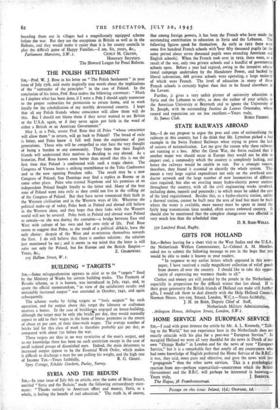STATE RAILWAYS ABROAD
Suto—I do not propose to argue the pros and cons of nationalising the railways in this country, but I do think that Mr. Lyttelton picked a bad example in the Swiss Federal Railways when trying to prove the lack of success of nationalisation. Let me give the reason why these railways are running at a loss. After the Great War, the Swiss realised that if another major war should occur in Europe they would not be able to .import coal, a commodity which the country is completely lacking, and hence the railways would be unable to run. For a strategic reason, therefore, they found it essential to electrify the whole system. This meant a very large capital expenditure not only on the overhead con- ductor network and the large number of new locomotives of different sizes required, but also on erecting many hydro-electric power stations throughout the country, with all the civil engineering works involved,
including dams, tunnels and penstocks ; to which must be added the cost of the land requisitioned. Besides this, as a hydro-electric station, unlike a thermal station, cannot be built near the area of load but must be built where the water is available, more money must be spent to instal the fairly long transmission lines needed, often across awkward country. It should also be mentioned that the complete change-over was effected in very much less than the scheduled time D. R. BattR-WELLS.
330 Lawford Road, Rugby.


























 Previous page
Previous page